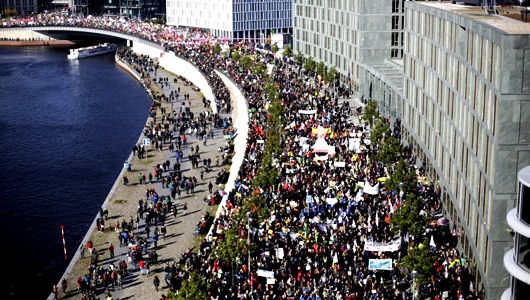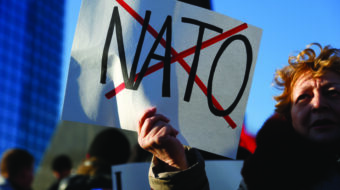
How is the battle going against austerity in Europe?
Portugal, which had a parliamentary election on October 5, does not yet have a new government. Although the conservative, pro-austerity coalition headed by Prime Minister Pedro Passos Coelho got a plurality of votes, he did not get a majority as in the last election in 2011.
Instead, left and center parties, including the Socialist Party, the CDU (an electoral coalition of the Communist Party and the Ecologist or “Green” Party) and the BE (Left Bloc) got a slight majority of the popular vote and, together, 122 votes in parliament to the right’s 84. If the Socialists, Communists, Greens and BE can come to an agreement, they could form a majority coalition government, ousting Passos Coelho.
This would be the first time in years that a communist party has been part of a coalition government in Western Europe. All four of these left and center parties define themselves as being anti-austerity but they differ on other issues, including whether Portugal should stay in the Euro Zone and in NATO.
However, both Jeronimo de Sousa, the general secretary of the Communist Party, and Catarina Martins, the head of BE, say their immediate priority is to oust the present government.
The Socialist Party’s secretary general, former Lisbon Mayor Antonio Costa, has expressed willingness to work with such a left-center alliance, and has also voiced great dissatisfaction with the alternative-a right center government wherein the Socialist Party would agree to keep Passos Coelho on as prime minister. So it looks like a left-center coalition may really be possible.
But if a government headed by Mr. Costa and supported by the Communists, Greens and BE comes to power and starts to push against austerity, won’t it probably meet the same fate as the SYRIZA government in Greece? Will Angela Merkel stride across the beach to come and kick sand in Portugal’s face?
This depends on factors beyond Portugal’s borders. Greece’s misfortune was its isolation in the face of a united European ruling class and political right, and the fact that its enemies were able to threaten a cutoff of funds for Greek banks if it did not bow to their demands.
With the exception of Cyprus, not a single European government supported Greece in its time of trouble.
But things may be changing. There is a parliamentary election in Spain on Dec. 20, and all indications are that the reactionary, repressive and corrupt administration of Prime Minister Mariano Rajoy will lose seats in the Cortes, or parliament. What kind of government will emerge through Spain’s complicated multi-party system is yet to be seen, but the right’s hand will, at any rate, be weakened. The Spanish left, which consists of the United Left (Izquierda Unida) comprising the Spanish Communist Party and the Communist Party of Catalonia and smaller groups, and PODEMOS, a new left-wing party that has arisen in the last couple of years out of anti-austerity, ant-corruption protests, both take strong positions against austerity. As in Portugal, much will depend on Spain’s old social democratic party, the PSOE or Spanish Socialist Workers’ Party.
It was ousted by angry voters in the last elections in 2011, precisely because of having accepted austerity policies. But the PSOE now has new leadership under its Secretary-General Pedro Sanchez Perez-Castrejon, who appears to have positioned himself to the left of the old leadership. Both the United Left and PODEMOS also have new, young and charismatic leaders in Alberto Garzon and Pablo Iglesias, respectively.
Ireland has to have an election by April 8, 2016. The Coalition government of Prime Minister Enda Kenny, which consists of his own conservative Fine Gael party and the social democratic Labor Party, has been pressured on the austerity issue by the left-nationalist Sinn Fein party and others. At this early point, polls suggest that a vote for “independents” is surging. What this means in terms of possible results it is too early to tell.
These are positive signs, but don’t add up to a massive all-Europe revolt against austerity and the dictates of the Troika.
On the streets, however, there are signs that mass mobilizations against the whole neo-liberal package, and especially the new so-called free trade agreements that are an integral part of it, are building strength. In Berlin on Oct. 7, a quarter of a million people marched to protest against the Atlantic versions of the Transpacific Partnership (TPP), the Transatlantic Trade and Investment Partnership (TTIP) linking the United States and the European Union, and CETA (the Comprehensive Economic and Trade Agreement) which links the European Union with Canada on the same neo-liberal, corporate dominated basis.
The Berlin demonstration was part of a whole series of protests involving a dozen European countries. Mundo Obrero, the newspaper of the Spanish Communist Party, interviewed one of the main leaders of the coalitions organizing the European protests, Felipe van Keirsbilck, the secretary general of Belgium’s C.N.E., a labor federation representing hundreds of thousands of private sector employees. Van Keirsbilck explained the goals of the growing mobilizations as: ” No to poverty, no to austerity, no to the TTIP and CETA, no to corruption, no to racism,” and yes to all European unity against these things.
If mass unity, transcending national borders, can indeed be built around such demands, great things can happen in Europe.
Photo: On Oct. 7 in Berlin, 250,000 demonstrate agaisnt corporate backed trade agreements. | Marcus Schreiber/AP












Comments